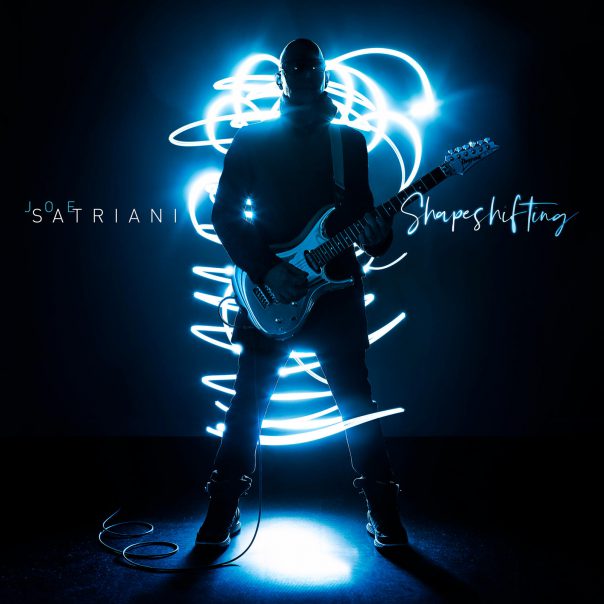ALBUM REVIEW: Joe Satriani ‘Shapeshifts’ to find what happens next

For shred legend Joe Satriani, 2018’s What Happens Next only lived up to its name until it dropped. The guitarist now had to find the new next thing. Two years after an electrifying, no-frills rock and roll romp, Satriani looks to his versatility for inspiration. For a guitarist so illustriously prolific, the question shifts from “what can I play?” to “what should I play?” In essence, Shapeshifting becomes the diversified counterpoint to its predecessor. Featuring an array of styles and feels, Satriani clearly has just as much fun throwing curveballs as he does line drives.
Shapeshifting
Joe Satriani
Legacy Recordings, April 10
Kenny Aronoff (of John Mellencamp fame) jumpstarts the title track with a blasting snare roll, before locking in with Jane’s Addiction bassist Chris Chaney’s addictive bass line. This new rhythm section maintains the direct impact of What Happens Next, but the arrangements are much more spacious. For all his technical ability, Satriani takes his time to develop his ideas here. Whether he develops the riff with Chaney, soars above the groove with his leads or fills every nook and cranny with impressionistic soloing, he sets the pace or an album of musical intrigue.
For anyone who appreciated the last album’s hard rock flare, “Big Distortion,” “Perfect Dust” and “Nineteen Eighty” embody that spirit in three distinct flavors. Co-producer Kenny Aronoff worked with Satriani for an album of bright, unabashed timbre. “Big Distortion” drops you in the middle of an ‘80s movie prom dance finalé—complete with handclaps, glossy leads and explosive glam-rock riffs. “Perfect Dusk” starts up a hard-swinging blues rock hoedown, with some surprising synth work from frequent collaborator Eric Caudieux. Tracks like “Nineteen Eighty” were clearly great fun for Satriani and company to record. Propulsive rhythms and empowered riffs stampede onto the scene like the Riders of Rohan.
As fun as those songs are, slower cuts provide more nuanced musicianship to chew on. “All for Love” brings an emotive refrain that reaches deep into the heart as those high notes rocket into the stratosphere. It’s power-ballad beat is the perfect foil for the bass-driven half-time shuffle at the foundation of “Teardrops.” In both cases, Satriani uses incredible restraint, approaching the guitar like a singer rather than a noodler. The extra space allows his euphonic melodies to shine, as Caudieux’s keyboard patches elevate the arrangement with nuanced ambiance.
The band’s willingness to hold back and let “Falling Stars” breathe allows the minimalist palm-muted riff and half-time beat at the start of the song to naturally build on itself. The arrangement feels both improvisational and calculated, as muscular rhythmic subdivisions and delicate piano embellishments ebb and flow. This balance of freedom and tightness vectorizes the real curveballs, the first of which comes as “Ali Farka, Dick Dale, an Alien and Me.” Part Afro-beat, and part intergalactic surf-rock, the song sees Satriani’s band seamlessly adapt from reggaeton rhythms to a grinding tremolo-picked apocalypse.
For every supercharged riff-driven song like “Spirits, Ghosts and Outlaws,” there’s a total wild card like “Here the Blue River” to live up to the album’s name. The two tracks juxtapose the album’s traditional rock element with its trips to left field. Any fan of chugging, wailing guitar music in its purest can’t look much farther than the former, while the latter inexplicably veers into reggae territory.
Neither approach sounds more compelling than the other, playing into the album’s central theme of change as a source of growth. Each musician shines within these different context, adding creative ideas with airtight execution. Unlike a lot of guitar heroes, Satriani makes a point to spotlight the chemistry between him and the other players. You’re just as likely to appreciate the licks from Aronoff and Chaney as you are his own.
Perhaps most importantly, Satriani clearly still has genuine love for his profession. Instead of trying to impress you with his technical ability or cling to mainstream relevance, he just has fun with it. The syncopated main riff of “All My Friends Are Here” embodies this attitude amid sheets of jubilantly pleasing sound. You can easily sing along with his melodies. Even during the hushed piano interlude “Waiting,” each player feels dialed in and intuitively playing off of one another. In fact, this track has Satriani building a grand atmosphere with almost no rhythmic support. His sense of dynamics and choice of notes tell epic tales with virtuosic melody.
Topped off by Lisa Coleman on piano and Christopher Guest on mandolin, “Yesterday’s Yesterday” closes out Shapeshifting in acoustic warmth. Shimmering organ and jangly chords embracing the song’s country western flavor, functioning as a pleasant resolve to an emotional rollercoaster of an album. Shapeshifting is the sound of a man simply enjoying his music—a celebration of Satriani’s effortless artistry. Having done so much over his career, it’s encouraging to hear his 18th album adapt his style to so many distinct styles.
Follow editor Max Heilman at Twitter.com/madmaxx1995 and Instagram.com/maxlikessound.
